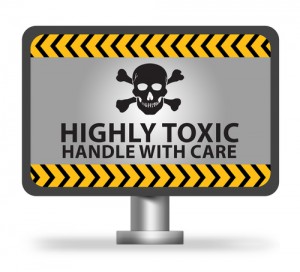4th April 2017
 Engaging and motivating staff should be high on the agenda for organisations and companies throughout the UK, especially with so much economic uncertainty in business following Brexit and Trump. But sometimes this involves dealing with “toxic” employees – those difficult employees whose behaviour can poison the atmosphere at a workplace in an instant, and bring down the performance of colleagues. What strategies can you use to deal with these toxic employees in your workplace?
Engaging and motivating staff should be high on the agenda for organisations and companies throughout the UK, especially with so much economic uncertainty in business following Brexit and Trump. But sometimes this involves dealing with “toxic” employees – those difficult employees whose behaviour can poison the atmosphere at a workplace in an instant, and bring down the performance of colleagues. What strategies can you use to deal with these toxic employees in your workplace?
Toxic behaviour comes in many forms
Toxic employees come in different forms. The most serious cases involve employees who bully others, sexually or racially harass colleagues or steal from their employers. In these cases urgent action including disciplinary, and sometimes criminal action is warranted. HR staff will have to follow correct well documented procedures, which could well end in dismissal.
Managing these employees effectively and stopping them damaging company productivity, or even driving colleagues to leave, can be difficult for HR teams. However in smaller companies there just isn’t the experience in house to deal with these hard toxic situations, and using an employee helpline, where professionals are on call to help, can get you on the right track.
However, toxic employees can also create other types of problems, and in many cases it is possible to step in before the situation reaches an explosive conclusion. For example, there might be someone in your team who is rude to colleagues in gradual subtle way but with very harmful effects. Machiavellianism is more prominent in the workplace than you think. Have you ever had an employee who “forgets” to copy others in on important business emails or invitations to meetings, or needlessly queries and second-guesses any instructions received.
The ‘negs’ in this workplace – those who are relentlessly negative and always moaning about the company and their boss – can hit morale and productivity within a department very hard. And there are others who under-perform less obviously. Have you ever had an employee who seems to chat about issues unrelated to work for long periods of the day, or seems to be constantly on the internet, snapchat, WhatsApp or other social media channels, distracting and annoying their colleagues.
Toxic plagues
A single toxic employee can create a plague in your office.
6000 employees surveyed in 2015 by Lund University showed that rude and inconsiderate behaviour can be contagious, and spread through a workplace like wildfire. When someone is insulted or overloaded with work by a colleague, that person may in turn be more likely to treat others badly, so that a toxic office culture is created.
Research also shows that good employees are far more likely to leave if they have to work with a toxic staff member. Sadly, this can mean you end up keeping the problem staff member on your books while there is a turnover of the valued colleagues who work with them, depriving your business of much-needed skills.
No silver bullet for toxic employees?
Dealing with Toxic employees can be hard. There are no easy answers.
As a starting point HR staff can try to understand what is causing the problem behaviour. There are many possible reasons for a negative outlook or lack of motivation, such as when someone is at a difficult stage in their career or feels as if they are in a rut. They could also be involved in a dispute with others in the company.
Problems and stresses outside the workplace are often a major factor, which affect an individuals’ mindset, performance and toxicity.
Regular engagement with employees, one to ones, effective appraisals and catch up sessions (formal/ informal) and good group communication can help set expectations and build positivity. Tackling the problem at an early stage will often have the best results, before positions become really entrenched.
ACAS advises establishing the facts of the situation and then arranging a private meeting with the staff member, where you state the problem clearly. This kind of meeting obviously needs to be handled sensitively and involves listening to what they have to say, while remaining in control of the situation. Sometimes having a quiet word with a member of staff can be all you need to do, and they will be able to turn their behaviour around.
It is also a good idea to look out for warning signs when recruiting people. For instance, as well as asking about key skills at interviews, it can be helpful to take note of how polite and genuinely helpful an applicant is. Asking about how they dealt with difficult situations in the past could be another pointer, as well as looking at their attitudes to previous employers and fellow workers.
But of course should you need to take things further make sure everything has been recorded. A good web based HR software system should have functionality for recording appraisals, training and managing employees, as well as including disciplinary and grievance. A complete on the go software solution for HR staff who are dealing with difficult employees, will enable them to retain a full record of what has been said and decided at each stage.


